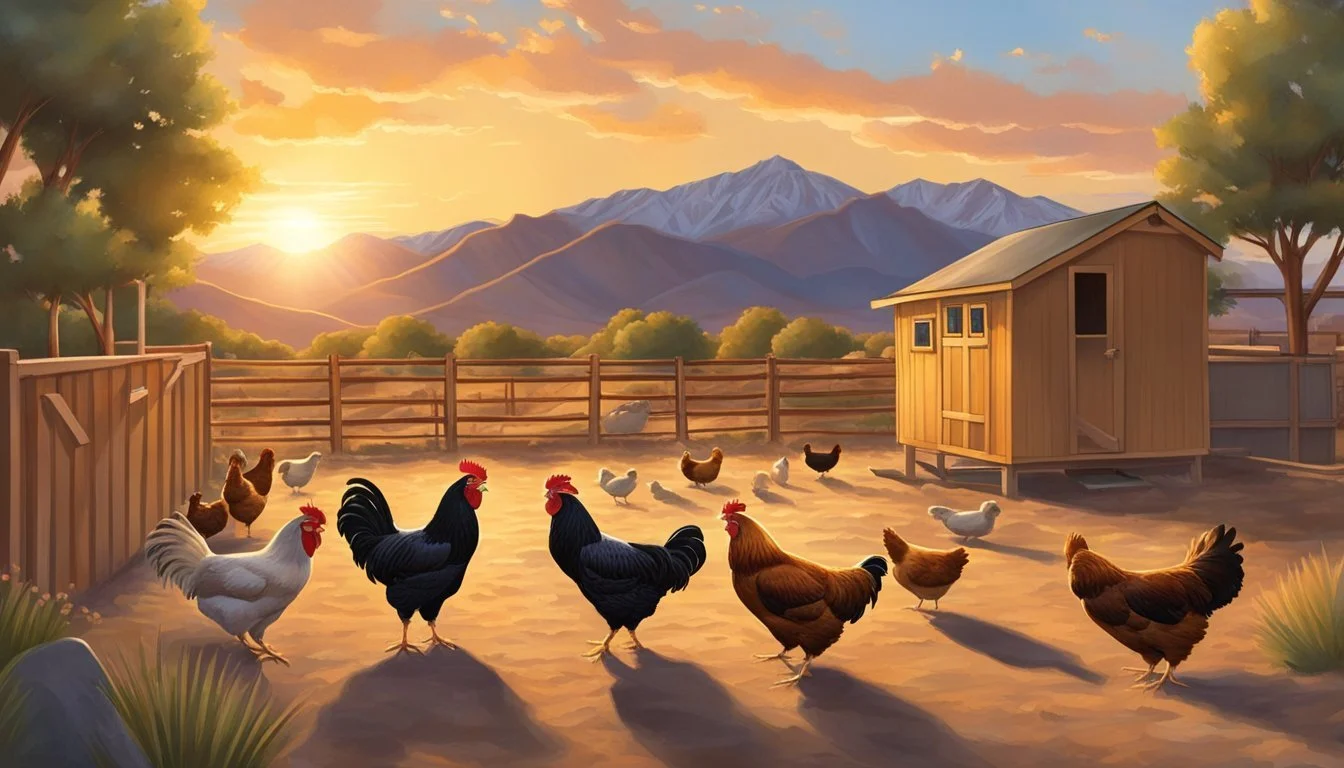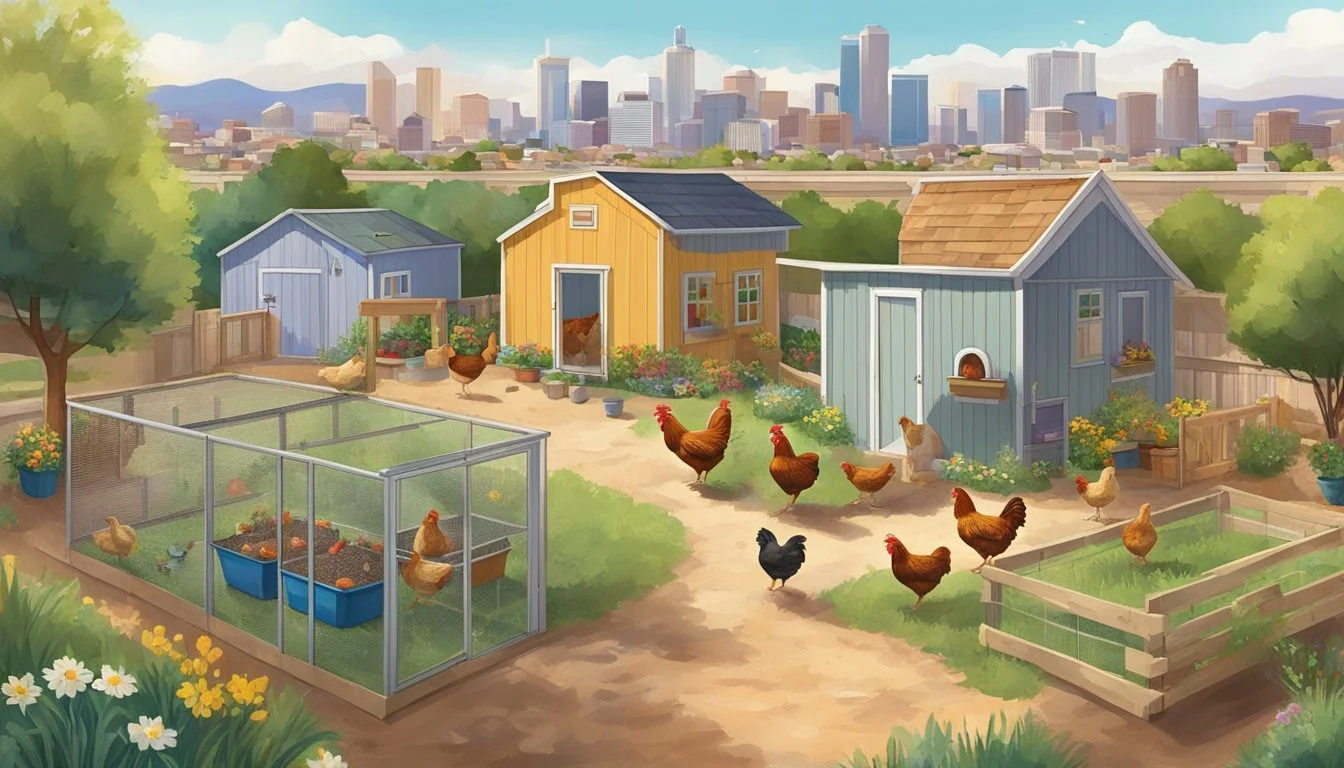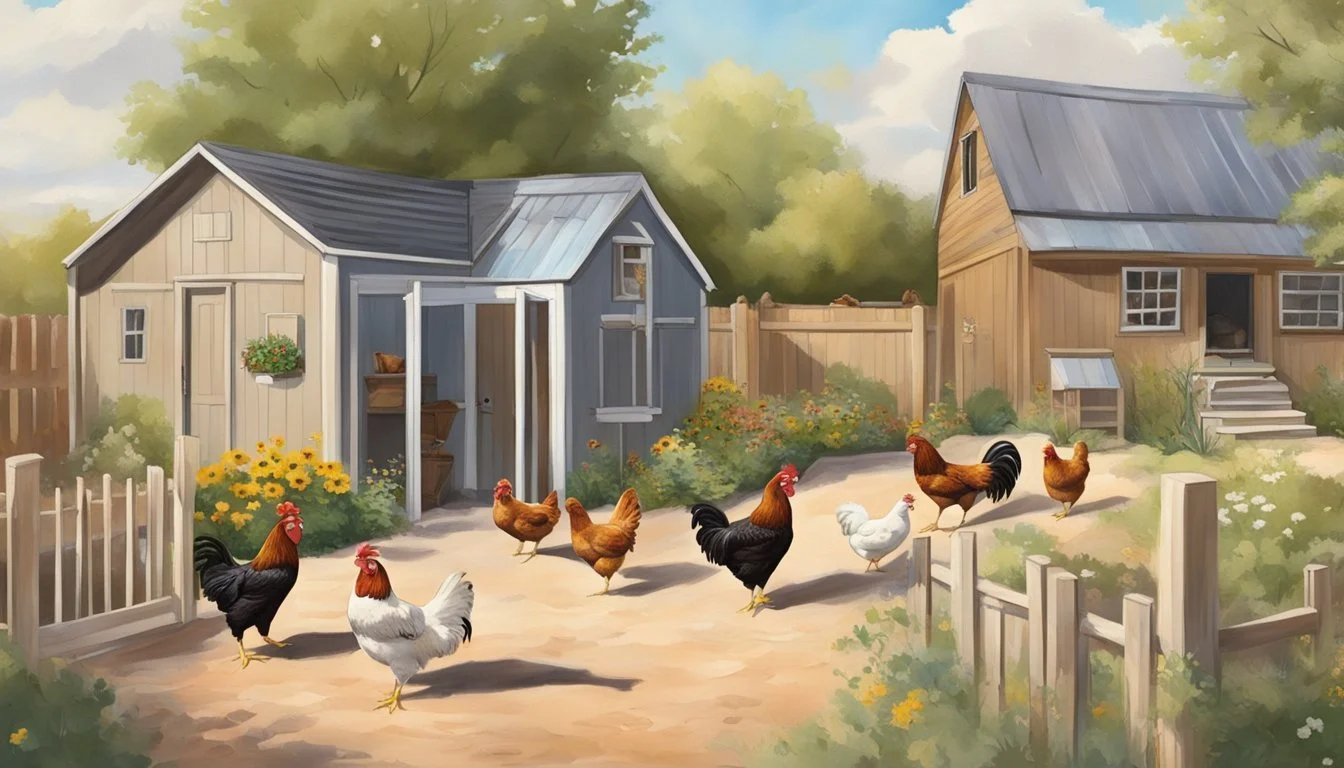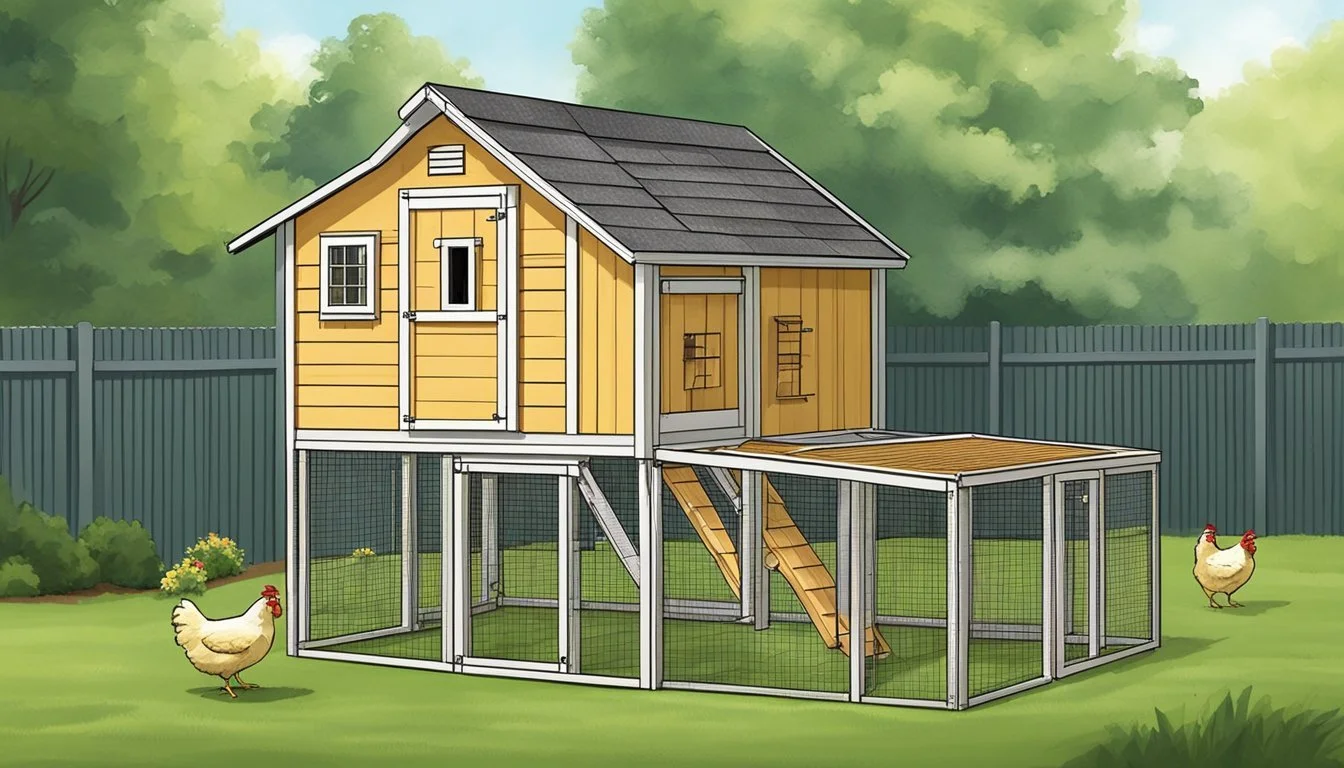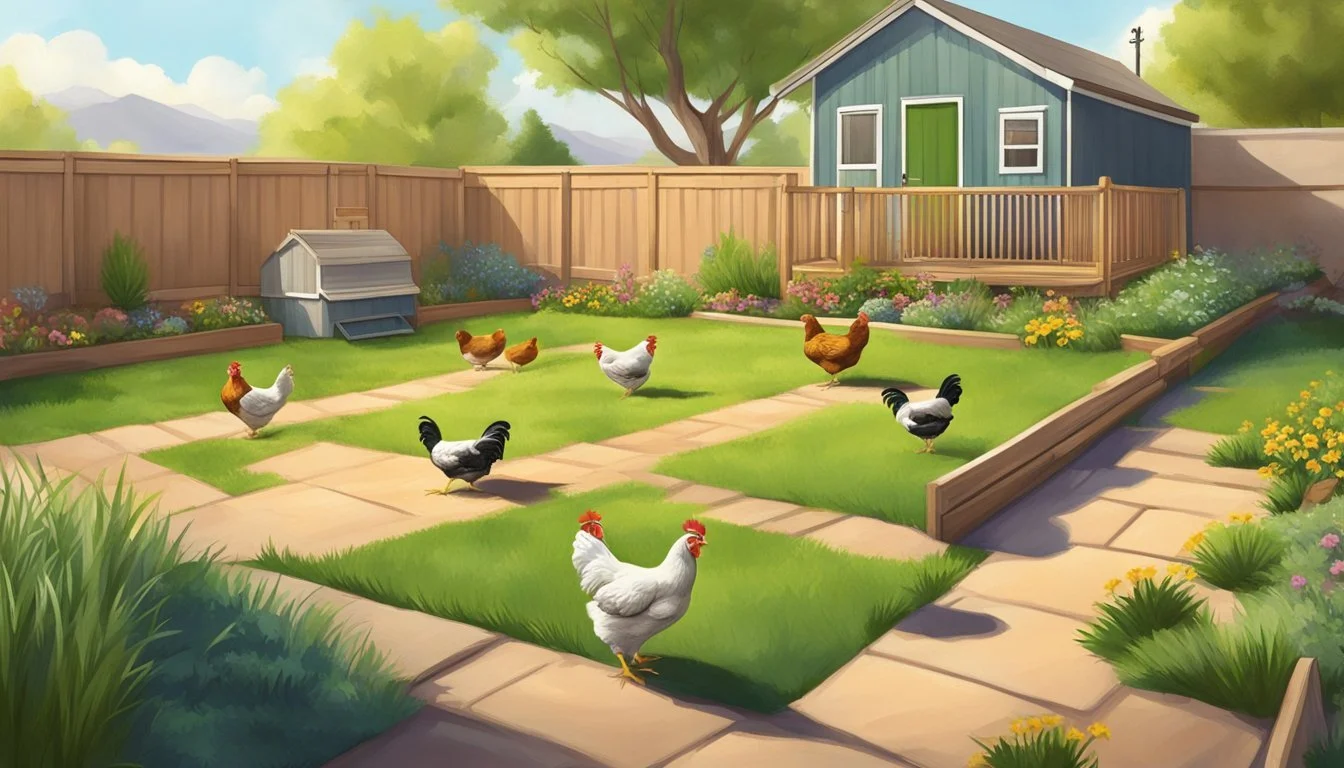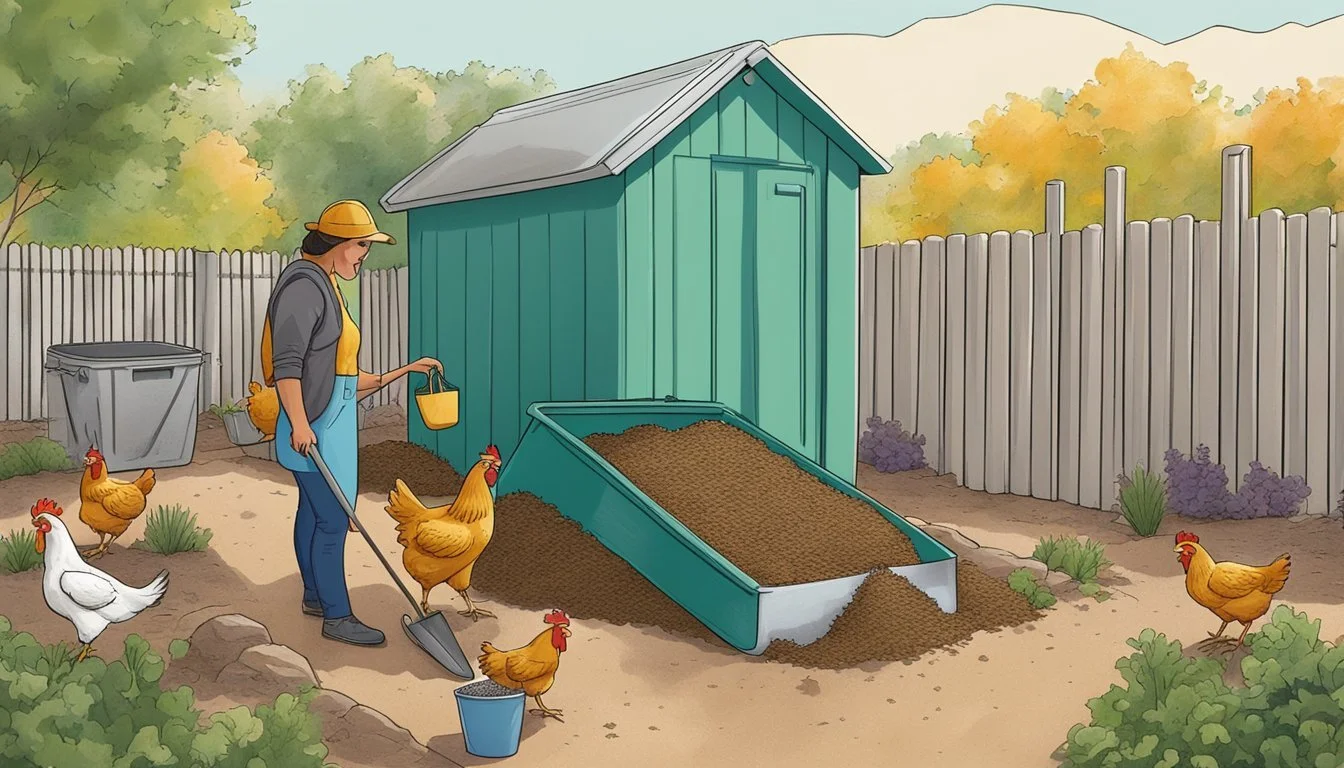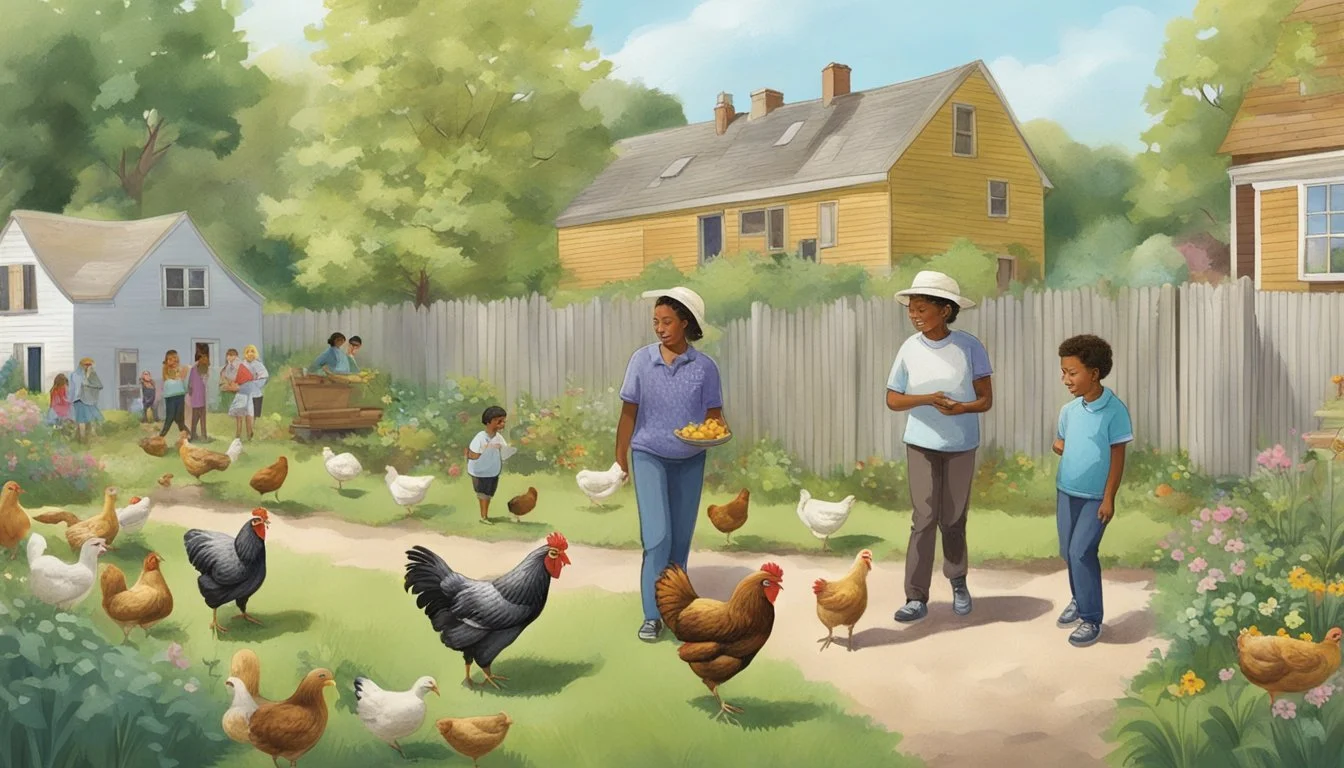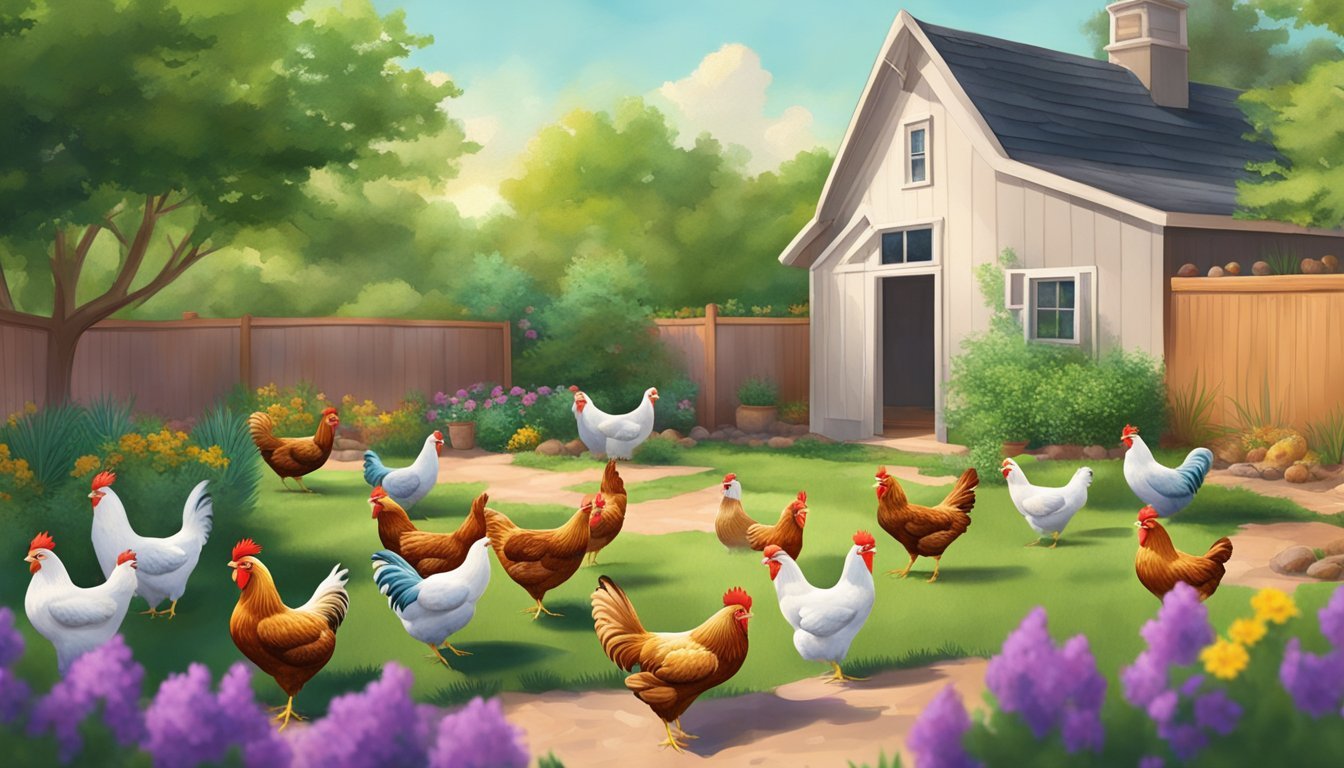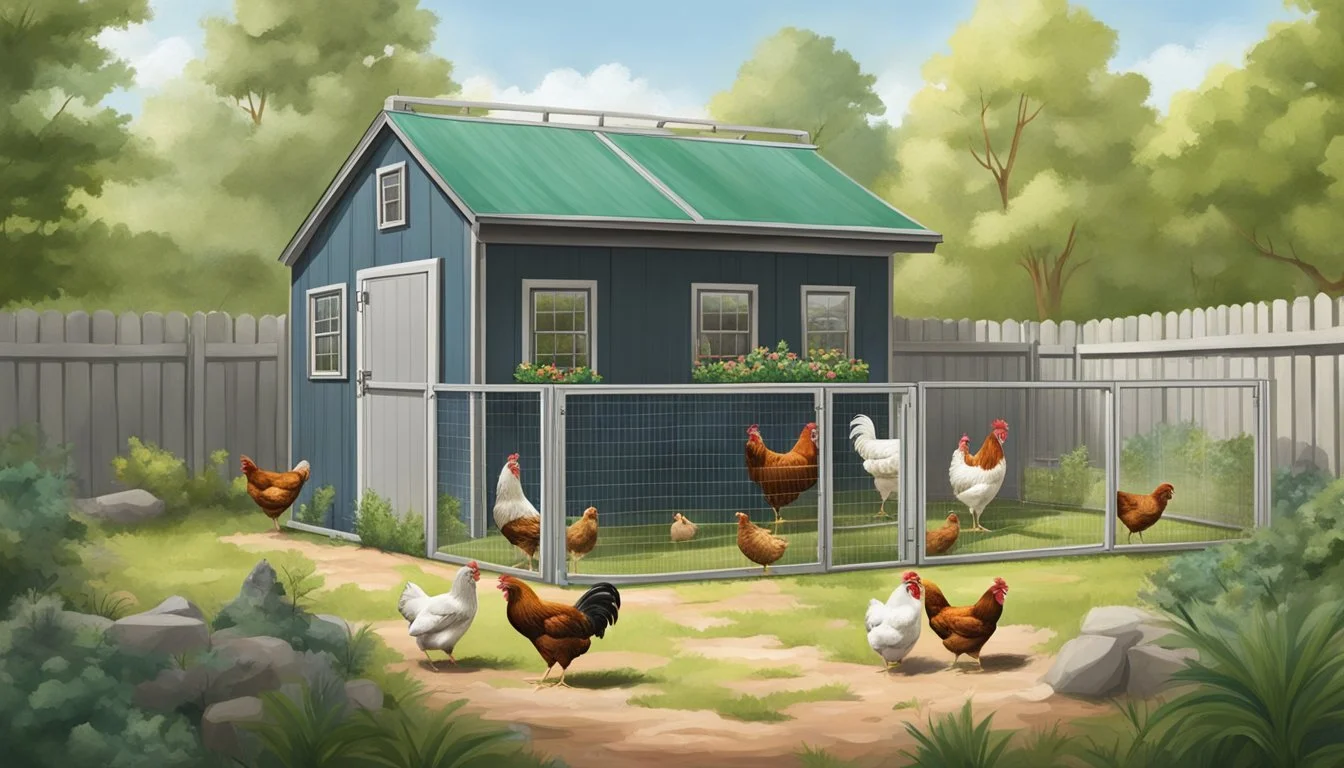Keeping Backyard Chickens in Albuquerque, NM
Essential Tips for New Owners
Backyard chicken keeping has been growing in popularity as a sustainable practice for obtaining fresh eggs and as a rewarding hobby. In Albuquerque, New Mexico, the city ordinances support this movement by allowing residents to keep up to 15 chickens in residential areas. The regulations are in place to maintain a harmonious environment both for chicken owners and their neighbors.
To ensure the well-being of the chickens and adherence to local laws, the city mandates specific housing requirements. Coops must provide ample ventilation and be positioned at least 10 feet from property lines to prevent any disturbances. Albuquerque's chicken-friendly attitude extends to including roosters within the city limits, though restrictions apply on their numbers.
Residents interested in raising chickens must also be mindful of the necessity of a secure, predator-proof coop or enclosure. The city requires annual permits from the Animal Welfare Department, and chicken owners must comply with zoning requirements, including providing sufficient space for the birds to ensure their health and comfort. This way, Albuquerque balances the interests of urban poultry enthusiasts with community standards.
Benefits and Challenges of Backyard Chicken Keeping in Albuquerque
Backyard chickens provide a source of fresh eggs and potential environmental benefits, while also presenting unique challenges in an urban setting like Albuquerque.
Environmental and Personal Benefits
Fresh Eggs: Residents of Albuquerque can enjoy a regular supply of fresh eggs from their backyard chickens. These eggs are often regarded as superior in taste and nutritional value compared to store-bought options.
Sustainability: Keeping chickens contributes to a sustainable lifestyle. Chickens are natural foragers, helping to control pests and reduce food waste by consuming kitchen scraps.
Common Urban Chicken-Keeping Challenges
Predators: Albuquerque's urban environment is home to various predators such as coyotes and birds of prey. Chicken coops must be secured to protect the poultry.
Maintaining Cleanliness: To prevent odors and attract pests, a clean coop is essential. Regular cleaning also deters the spread of diseases among chickens.
Space Restrictions: Even though Albuquerque permits up to 15 chickens, limited space can be an issue. Proper planning is required to ensure each chicken has enough room to roam safely.
Regulations Compliance: Chicken keepers must adhere to city regulations governing the housing and restraint of chickens to avoid penalties.
Understanding Albuquerque's Chicken Ordinance
Albuquerque's chicken ordinance allows for backyard chickens within city limits under specific conditions and with adherence to local zoning laws.
Legal Requirements and Limitations
In Albuquerque, New Mexico, residential areas are entitled to keep chickens, with the ordinance permitting up to 15 chickens per property. However, there are stipulations that need to be followed. These birds must be kept for noncommercial purposes, and there needs to be compliance with any applicable zoning laws. It is important to note that while roosters are permitted, they may be subject to additional regulations due to noise ordinances.
Property lines play a role in the placement of coops and runs. The ordinance may require that such structures be situated a specific distance from neighboring homes, though the exact measurement was not provided in the search results. Proper sanitation and noise control measures are required to minimize any impact on the surrounding community.
Permit Process and Legal Compliance
To own chickens in Albuquerque, residents may need to go through a permit process, depending on the number of chickens and the specific zoning district in which they reside. Compliance with the city's animal welfare ordinances is mandatory, and this includes housing conditions for the chickens and ensuring they are free from cruelty and neglect.
Potential chicken owners should contact Albuquerque's zoning office or an equivalent municipal department to obtain precise information regarding any permits required. Permits ensure that all legal requirements are met and that the keeping of chickens does not infringe upon the rights and comfort of neighbors. The city's guidelines and regulations are in place to foster responsible animal keeping and community harmony.
Choosing the Right Chicken Breeds
When selecting chickens for a backyard flock in Albuquerque, NM, it's essential to consider the breed's temperament and climate adaptability. The right breeds will not only thrive in the local conditions but will also exhibit characteristics suited for cohabitation and egg production.
Characteristics of Popular Chicken Breeds
Different breeds of chickens exhibit a diverse array of temperaments, sizes, and egg-laying capacities. For instance, some lay colored eggs, whereas others are known for their friendly nature:
Jersey Giants: Known for their considerable size and gentle demeanor, they are often referred to as "gentle giants" and are compatible with other breeds due to their friendly nature.
Rhode Island Reds: These birds are hardy and known for being excellent layers, producing a substantial number of eggs.
Plymouth Rock: These chickens are adaptable, friendly, and reliable for steady egg production.
Orpingtons: Well-regarded for their docility and fluffy feathers, Orpingtons also lay a fair amount of eggs and are good for colder climates.
Suitable Breeds for Albuquerque's Climate
Albuquerque's climate demands specific considerations for chicken breeds. Breeds suitable for this region should be able to handle varying temperatures:
Cold Hardy Breeds: These chickens have dense feathering and smaller combs to prevent frostbite. Examples include the Brahma and Orpington.
Heat Tolerant Breeds: Breeds with lighter feathering and larger combs are better suited for the heat, like the Leghorn and Australorp.
In Albuquerque, chicken keepers can enjoy a range of breeds in their flocks, provided they cater to the needs of their chosen breeds and ensure a harmonious backyard environment.
Designing and Constructing a Proper Chicken Coop
When constructing a chicken coop in Albuquerque, NM, a builder must consider the specific needs for space and security due to the local climate and predators.
Coop Size and Location
In Albuquerque, where temperatures can vary dramatically, a coop should provide at least 3 square feet per chicken inside and 10 square feet in an outside run. The coop should be elevated to prevent predators and flooding, facing south to ensure sunlight exposure while providing adequate shade. Location within the backyard should allow for easy access for cleaning and egg collection, with considerations for local zoning laws.
Minimum Space Requirements:
Inside coop: 3 sq ft per chicken
Outside run: 10 sq ft per chicken
Orientation:
Coop entrance facing south
Elevation for predator and flood prevention
Location Considerations:
Access for maintenance and egg retrieval
Compliance with zoning regulations
Essential Features for Safety and Comfort
A chicken coop must offer protection from predators and the elements, while also maintaining a comfortable environment for the chickens to thrive.
Ventilation: Adequate airflow through the coop is crucial to prevent respiratory issues.
Insulation: Proper insulation helps regulate the internal temperature during Albuquerque's hot summers and cool winters.
Roosting Bars: Elevated roosting bars give chickens a natural perching spot; the recommended height is 2 to 3 feet.
Nesting Boxes: One box for every 3 to 4 chickens, positioned in the darker area of the coop for privacy.
Security: Strong wire mesh and secure latches keep out predators like raccoons and coyotes.
Accessibility: Doors should allow chickens to move freely to their run and for keepers to clean.
For ventilation and insulation:
Install vents or windows but ensure they are predator-proof.
Roosting Bars:
Space bars 16 inches apart
Use 2" x 4" lumber, wide side up
Nesting Boxes:
Size roughly 12"x12"x12"
Dark, quiet corner of the coop
Security Measures:
Hardware cloth (1/4 inch or smaller mesh size) over openings
Locks on doors and nesting boxes
By adhering to these guidelines, one can design and construct a suitable coop that creates a secure and comfortable environment for backyard chickens in Albuquerque, NM.
Feeding and Watering Your Flock
Proper nutrition and consistent water supply are critical for the health and productivity of backyard chickens. Owners should ensure a balanced diet tailored to the flock's specific needs and maintain clean water sources to support their chickens' growth and egg production.
Nutritional Requirements
Chickens require a balanced diet composed of proteins, carbohydrates, fats, vitamins, and minerals. A typical layer needs about 16-18% protein in her diet to maintain regular egg production. Commercial layer feed typically meets these needs. However, for chickens in a backyard setting, dietary adjustments might be necessary to compensate for the varied environment.
Chicks: Starter feed with 20-24% protein.
Pullets: Grower feed transitioning to layer feed with 14-16% protein.
Layers: 16-18% protein with calcium supplements for eggshells.
Broilers: Higher protein, around 22%, for muscle development.
Grit, made of tiny rocks or coarse sand, should be available for chickens to aid in digestion, and oyster shell or limestone can be provided to laying hens for calcium supplementation to ensure strong eggshells.
Feeding Strategies and Water Management
Feeding: A consistent feeding schedule helps maintain healthy chickens.
Chicks require continuous access to feed due to their rapid growth.
Adult Chickens: They can have a more regulated feeding schedule—once or twice a day.
Scatter feeding promotes foraging behavior and can be an effective method for backyard flocks.
Water: Chickens need constant access to clean water.
Water containers should be cleaned regularly to prevent the spread of diseases.
In cold climates, water heaters might be necessary to prevent freezing.
Automatic waterers can ensure a consistent supply but must be monitored for blockages and leaks.
Adequate feed and water management will not only support the chickens' daily activities but also play an essential role in the quality and quantity of the eggs produced.
Health and Wellness for Backyard Chickens
Keeping backyard chickens in Albuquerque means ensuring their ongoing health and wellness through routine checks and the proactive management of common ailments.
Routine Health Checks
Backyard chicken keepers should perform weekly health examinations to ensure their chickens are in good condition. These examinations should include checking the birds' weight, looking for signs of parasites, and observing their behavior for any changes. Weight is a strong indicator of health, as sudden loss may suggest illness or parasites. Parasites, such as mites and lice, are common and can be spotted in the feathers or around the vent. Behavioral changes, like decreased activity or appetite, often indicate health issues.
Preventing and Addressing Common Ailments
Prevention is critical in backyard poultry care. A clean coop, quality feed, fresh water, and proper hygiene practices reduce disease incidence. Chickens in Albuquerque should be vaccinated against prevalent diseases like Marek's disease.
When ailments occur, knowing the symptoms of common illnesses like respiratory infections or egg binding is instrumental for timely intervention. Respiratory issues might manifest through coughing or wheezing, while a hen with egg binding might appear lethargic or have a swollen abdomen. In both cases, it is often necessary to consult with a veterinarian experienced with poultry.
Managing Chicken Waste
Effective waste management is essential for maintaining a healthy backyard chicken environment in Albuquerque, NM. Well-managed chicken manure can be a boon to garden soils, while addressing odor and sanitation ensures a neighbor-friendly coop.
Composting Chicken Manure
Composting chicken manure is a beneficial practice, as it transforms waste into valuable fertilizer for gardens. Chicken manure is high in nitrogen, phosphorus, and potassium, nutrients that are desirable for plant growth. However, fresh chicken manure is too strong for direct application, as it can burn plants and pose a health risk due to pathogens.
Process: Begin composting by combining the chicken manure with carbon-rich materials such as leaves, straw, or sawdust. This mix should then be placed in a compost bin or pile.
Timeframe: It typically takes between 6 to 9 months for the manure to fully compost and become safe for use in the garden.
Ratios: A general guideline is to maintain a carbon to nitrogen ratio of 30:1 for optimal composting conditions.
Odor Control and Sanitation
Maintaining odor control and sanitation is crucial to prevent attracting pests and maintain a pleasant environment.
Regular Cleaning: Coop should be cleaned regularly to remove manure. Use a shovel or a manure scraper to clear the buildup.
Ventilation: Proper ventilation helps disperse odors and reduces moisture within the coop.
Litter Management: Use absorbent materials like straw or wood shavings on the coop floor to help absorb droppings and minimize odor.
By managing composting correctly and maintaining high standards of odor control and sanitation, backyard chicken keepers in Albuquerque can ensure they are not only being responsible neighbors but also enriching their gardens.
Dealing with Predators and Pests
Keeping backyard chickens in Albuquerque involves safeguarding them from various predators and pests. A secure coop and enclosure are vital for the flock's safety.
Identifying Common Threats
In Albuquerque, common predators that pose a threat to backyard chickens include:
Canids: Coyotes and foxes are adept at digging and can breach unsecured enclosures.
Felines: Domestic and feral cats may prey on smaller or younger birds.
Birds of prey: Hawks and eagles can swoop down into chicken yards, especially those without overhead netting or cover.
Rodents: Rats and mice not only consume feed but can also spread disease and stress to the flock.
Raccoons: These clever mammals can manipulate latches and open unprotected gates or doors.
Protective Measures and Solutions
Effective strategies to protect chickens include:
Fencing: A sturdy, buried fence around the coop and run area thwarts digging predators.
Locks: Raccoon-proof locks on coop doors deter intelligent pests.
Netting: Overhead netting defends against avian predators.
Sanitation: Regular cleaning minimizes attracting rodents by removing leftover feed and droppings.
Inspection: Frequent checks for gaps or vulnerabilities in the coop and enclosure prevent unexpected invasions.
Habitat Modification: Removing brush or debris around the coop area limits hiding spots for predators.
Interacting with the Community and Neighbors
Keeping backyard chickens in Albuquerque can enrich a community and offer fresh eggs, but it also requires consideration of neighbors. Addressing potential issues proactively and maintaining open communication lines can foster a harmonious environment for everyone involved.
Addressing Noise and Nuisance Concerns
Noise: Chickens, especially roosters, can be noisy. Residents must ensure that their chickens' housing is at a minimum distance of 10 feet from property lines to minimize disturbances. Although roosters are allowed in the city, one should check if there are more specific restrictions in their neighborhood association's bylaws.
Odor and Attraction of Pests: Regular cleaning of the coop reduces odor and the attraction of pests, thus decreasing the likelihood of any nuisance complaints from neighbors.
Ordinances may vary by location; therefore, owners should review both city and neighborhood association rules before setting up their chicken coops.
Building Good Relationships with Neighbors
Communication: Openly discussing plans for keeping chickens with neighbors can preempt conflicts and help establish respectful relationships.
Transparency: Showing the coop setup and sharing information about how it will be maintained can alleviate concerns and demonstrate commitment to the community’s well-being.
Sharing Eggs: Offering fresh eggs to neighbors can be a generous way to connect and share the benefits of backyard chickens.
By engaging neighbors and handling chickens responsibly, people can integrate backyard chickens into the community in a way that is considerate of everyone's peace and enjoyment.
Expanding Your Backyard Flock
In Albuquerque, NM, expanding your backyard flock requires careful consideration of integration strategies and egg production management.
Introducing New Birds
When chicken keepers introduce new birds to an existing backyard flock, it's crucial that they follow a gradual and careful process to ensure smooth integration. Quarantining new chickens for a minimum of 30 days reduces the risk of disease transmission and allows observation for any health issues. After quarantine, introducing birds in a neutral space helps to mitigate aggressive behaviors and establishes a hierarchy without territorial disputes. Chicken keepers should closely monitor these interactions for pecking order rearrangements and intervene if excessive pecking occurs.
Breeding and Egg Production
Breeding backyard chickens creates an opportunity for Albuquerque residents to sustain and expand their flocks naturally. Chicken keepers should maintain one rooster per flock if breeding is intended, as Albuquerque allows up to 15 chickens, including a single rooster. An optimal ratio for breeding purposes commonly stands at one rooster to every ten hens. This ensures efficient egg fertilization rates and minimizes over-mating stress on the hens. Regular collection of eggs for consumption must be balanced with leaving eggs for incubation, which influences the flock's egg production rates. Egg-laying breeds generally start producing eggs at around 18 to 22 weeks of age, and peak egg production typically happens during the first year or two.
The Legalities of Chicken Products
When keeping backyard chickens in Albuquerque, NM, residents must navigate specific legalities regarding the production and distribution of chicken products. The main points of consideration are the consumption and sale of eggs and the regulations surrounding slaughtering for personal consumption.
Egg Consumption and Sales
In Albuquerque, the consumption of eggs from backyard chickens is permitted without special regulations. However, when it comes to the sale of eggs, residents are required to adhere to certain guidelines to ensure public safety. These guidelines include:
Proper Egg Handling: Eggs must be collected frequently, washed, and refrigerated promptly.
Packaging Standards: Eggs intended for sale must be packaged in clean cartons that are labeled with the seller's information.
Licensing and Inspection: Depending on the volume of egg sales, a license from the New Mexico Department of Agriculture may be necessary, along with periodic inspections.
It is important for sellers to check with local health authorities for any additional requirements that may apply.
Regulations on Slaughtering
The process of slaughtering chickens for personal consumption is regulated to ensure it is performed humanely and safely. The key regulations include:
Slaughtering Location: Slaughtering must take place within the owner's property, away from public view, to prevent public nuisance and maintain sanitation.
Waste Disposal: All waste materials must be disposed of properly to prevent attracting pests and causing health hazards.
No Sale of Meat: Slaughtered chickens are for personal consumption only. The sale of home-slaughtered chicken meat is not permitted without compliance with state and federal processing regulations.
Owners intending to slaughter their chickens should be well-versed in the proper techniques and legal requirements to avoid any violations.
Further Resources and Information
Residents of Albuquerque seeking more information on keeping backyard chickens can consult several resources for guidance. The Albuquerque Bernalillo County Library is a valuable source for literature on the subject, offering an array of books on chicken care, benefits, and urban farming practices.
For specifics on local regulations, individuals can reach out to the City of Albuquerque Animal Welfare Department. It maintains a clear set of guidelines and is an essential resource for both new and experienced chicken owners. The department ensures that chickens are kept in humane conditions and that the owners adhere to city ordinances.
The following table lists the contact information and links for further support:
Organization Contact Information Link Last Updated Albuquerque Bernalillo County Library Contact through their website or local branch Library Link N/A City of Albuquerque Animal Welfare Department (505) 768-2000 Animal Welfare Department N/A ChickenLaws.com N/A Albuquerque Chicken Laws N/A
Online platforms like ChickenLaws.com are regularly updated and provide an easy-to-understand overview of chicken-related laws for both Albuquerque and the state of New Mexico. They can serve as a starting point for anyone looking to familiarize themselves with legal requirements.
It is crucial that all chicken keepers stay informed about the latest rules and best practices for raising chickens responsibly in an urban setting. The above resources are there to equip residents with the knowledge to ensure a safe, legal, and enjoyable experience with backyard chickens.

